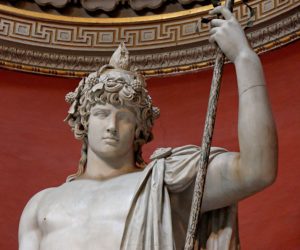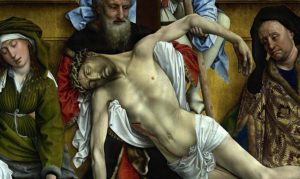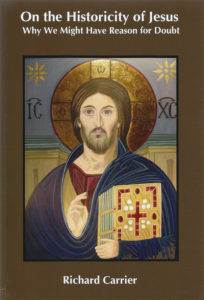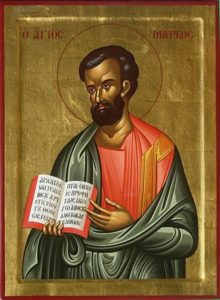Jews in Rome before the Jewish Wars
Long before it was repackaged for the Gentiles, the Big Lie was a Jewish self-delusion. As I have detailed at the end of my long article ‘Zionism, Crypto-Judaism and the Biblical Hoax,’ in the sixth and the fifth century BC in Babylon, a priestly elite from Jerusalem decided that Yahweh, the national god of Israel, although apparently vanquished, was in fact the only real god, and, by way of consequence, the Creator of Heaven and Earth. A laughable claim, but when the Persians conquered Babylon, those Jews, who found themselves in a favourable position after helping the Persians, set out to pretend that their theoclastic monotheism, based on the exclusion of all other gods, was identical to the tolerant monotheism of the Persians; in other words, that their tribal god Yahweh was Ahura Mazda, the God of Heaven. I have shown that the deception is clearly apparent in the Books of Ezra and Nehemiah, where only Persians are portrayed as believing that Yahweh is ‘the God of Heaven,’ while for the Israelites he is just ‘the god of Israel.’
What the priestly Jews achieved in Babylon in the fifth century BC was a preliminary stage for what another generation of the same priestly cast would start planning in the first century AD in Rome, after having been brought there in similar conditions of captivity. While Yahweh seemed again vanquished, he set out to conquer his victor from within. The conspiracy of Babylon’s Jews to fool the Persians with their phony monotheism was the blueprint for the more sophisticated conspiracy of Rome’s Jews to fool the Romans with Christianity.
Between those two stages, Jews seem to have convinced a portion of the Roman aristocracy that they were the first true monotheists, the worshipers of the true God. For Greeks and Romans, the supreme Creator was a philosophical concept, while religious cults were polytheistic by definition. That’s why, around 315 BC, the Aristotelian Theophrastus of Eresus thought of the Jews as ‘philosophers by birth,’ although he was troubled by their primitive holocausts. Some Jewish writers (Aristobulus of Paneas, Artapanos of Alexandria, or even Philo of Alexandria) had even succeeded in bluffing some Greeks with the wild claim that Homer, Hesiod, Pythagoras, Socrates and Plato had been inspired by Moses.[8]
Jews are mentioned in Rome as early as the second century BC. It has been surmised that they were mostly converted Phoenicians. Martin Bernal defends that thesis in Jews and Phoenicians, with the argument that ‘there is no evidence of Jews in the West Mediterranean before the destruction of Carthage [146 BC],’ but ‘after that date, they were widely reported there,’ while Phoenicians faded from the pages of history.
Phoenicians and Jews’ languages and cultures were virtually identical.[9] Peter Myers brings additional light in his well-sourced article ‘Carthaginians, Phoenicians & Berbers became Jews’, arguing that, ‘After the destruction of Carthage by Rome, many Carthaginians and Phoenicians converted to Judaism, because Jerusalem was the only remaining centre of West Semitic civilization.’
The Encyclopedia Judaica’s article on Carthage, quoted by Myers, supports that hypothesis, adding that the Phoenicians, by converting to Judaism after their political decline, ‘preserved their Semitic identity and were not assimilated by the Roman-Hellenistic culture which they hated.’ This theory, which also explains the mysterious origin of the Sephardim in Spain—a Carthaginian colony—, is of obvious importance to comprehend the attitude of Jews towards the Roman Empire, destroyer of the Phoenician civilization.
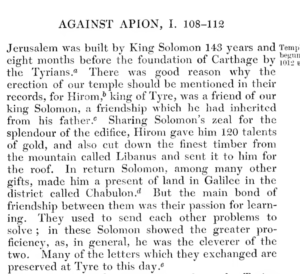 (Left, Flavius Josephus highlights the ancient affinity between Phoenicians and Jews.) In 63 BC, Rome’s Jewish community was enlarged with thousands of captives brought back from Judea by Pompey, and progressively freed (Philo of Alexandria, Legatio ad Caium, 156). It is believed that Julius Cesar introduced legislation to guarantee their religious liberty, and that the law was confirmed by Augustus, who also exempted them from military service. Emperor Claudius (41-54 AD) is said to have expelled the Jews from Rome (Suetonius, Claudius xv, 4; Acts 18:2), or at least forbidden them to congregate (Cassius Dio lx, 6). But they seem to have known favourable times under Nero (54-68), whose wife Poppaea Sabina is regarded as an Esther-type secret Jewess in Jewish tradition, because Jewish historian Flavius Josephus calls her ‘a God-worshipper’ (Antiquities of the Jews, xx, 195) and mentions her support for the release of Jewish priests prosecuted in Rome (Vita 16).[10]
(Left, Flavius Josephus highlights the ancient affinity between Phoenicians and Jews.) In 63 BC, Rome’s Jewish community was enlarged with thousands of captives brought back from Judea by Pompey, and progressively freed (Philo of Alexandria, Legatio ad Caium, 156). It is believed that Julius Cesar introduced legislation to guarantee their religious liberty, and that the law was confirmed by Augustus, who also exempted them from military service. Emperor Claudius (41-54 AD) is said to have expelled the Jews from Rome (Suetonius, Claudius xv, 4; Acts 18:2), or at least forbidden them to congregate (Cassius Dio lx, 6). But they seem to have known favourable times under Nero (54-68), whose wife Poppaea Sabina is regarded as an Esther-type secret Jewess in Jewish tradition, because Jewish historian Flavius Josephus calls her ‘a God-worshipper’ (Antiquities of the Jews, xx, 195) and mentions her support for the release of Jewish priests prosecuted in Rome (Vita 16).[10]
______ 卐 ______
Editor’s note: When Greg Johnson criticised William Pierce’s Who We Are years ago, he argued that Pierce, with his suggestion that the ancient Aryans should have exterminated the non-Aryans, was saying something monstrous. Johnson even called ‘whites’ those mudblood Cauacsoids whom we now assume had Semitic, though not Jewish, blood.
White nationalism would be greatly enriched by admitting that the Judean war against Rome has been in reality a psychological war of the Semites (including non-Jews, such as the Phoenicians and the Carthaginians who survived the Third Punic War) against the Aryans. It is a great pathology that infects even white nationalism not want to see the macro-dynamics of the clash between Semites and Aryans that has been going on for millennia.
I blame Christian ethics for that. (Recall, for example, that a dozen years ago Johnson delivered homilies at his church in San Francisco. He has since abandoned Christianity and is now a pious neochristian—just read his The White Nationalist Manifesto.) If Christian ethics is to blame, for transvaluing Semitic values Pierce’s book should be the textbook of American racialists. But I understand that the copyright holders, the National Alliance, haven’t yet published it.
Or am I wrong?
___________
[8] Joseph Mélèze Modrzejewski, The Jews of Egypt, From Rameses II to Emperor Hadrian, Princeton University Press, 1995, pp. 48-49, 66.
[9] Martin Bernal, Geography of a Life, chap. 45, ‘Jews and Phoenicians,’ pp. 386-394.
[10] Nahum Goldmann, Le Paradoxe juif. Conversations en français avec Léon Abramowicz, Stock, 1976, p. 36; Heinrich Graetz, Histoire des Juifs, A. Lévy, 1882 (on fr.wikisource.org), tome I, p. 413-428.



